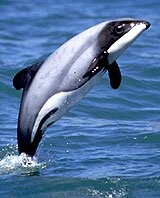[ Return ] [ Other news articles ]
[ Other news articles ]
Set netting care urged after dolphin deaths
January 13th, 2015
[DOC press release]

The Department of Conservation is urging fishers to take care using set nets in Tasman and Golden bays after two endangered Hector's dolphins were found dead in Tasman Bay in recent days, one in a set net.
A recreational fisher found a Hector's dolphin calf that appeared dead in his set net near Wakefield Quay in Nelson city on Friday 9 January. A dead adult Hector's dolphin was then found off lower Queen Street near Richmond on Sunday 11 January.
The cause of the dolphins' deaths is still to be determined. The calf is to be autopsied at Massey University to establish how it died. The adult is too decomposed to autopsy and it has been buried.
Set netting poses a major threat to Hector's dolphins which are unique to New Zealand. They are only found in inshore waters, often close to shore, making them vulnerable to getting entangled in set nets and drowning, particularly when seawater is murky reducing visibility.
DOC Acting Motueka Conservation Services Manager Chris Golding said the young Hector's dolphin had been accidentally caught in the set net and the recreational fisher had done the right thing in reporting it to DOC.
"Until we get the autopsy results we don't know whether the calf died as a result of being caught in the set net or if it was already dead.
"The adult dolphin was possibly the calf's mother. It had been dead for some time when found.
"Hector's dolphins are known to be in Golden Bay and have been seen off Abel Tasman National Park and other western areas of Tasman Bay. There have been a few reported sightings of Hector's dolphins in the last couple of years off Nelson and Rabbit Island.
"The finds of the two Hector's dolphins in Tasman Bay serve as a reminder that care is needed in use of set nets to avoid accidentally catching dolphins.
"Nets should not be set overnight and fishers should stay with their nets at all times, keeping watch for dolphins. If a dolphin is seen, nets should be pulled out of the water. Nets should not be set anywhere where there are dolphins around.
"To help protect Hector's dolphins and other dolphins and whales, care should also be taken in boats around them. Boaties should keep at least 50 metres away from whales and operate a 'no wake' or idle speed within 300 metres of whales and dolphins."
Anyone catching a marine mammal in a set net must report it to the Department of Conservation or the Ministry for Primary Industries. DOC is also asking people to report sightings of Hector's dolphins. Reports can be made to the 0800 DOC HOTline ().
DOC is also keen to know about sightings of other whales and dolphins, especially southern right whales, blue whales and humpback whales. Sightings can also be reported online at .
It is easy to identify Hector's dolphins from other dolphins. Hector's dolphins have a distinctive black, rounded dorsal fin, black flippers, a black crescent over their blowhole and a blunt snout (nose).
>> , to be added to the page. [If this link doesn't work, use this form instead]
[ Return ]
[ Other news articles ]
We wish to thank these local community-minded businesses who generously sponsor our site. They recognise the value of supporting this community asset, and in return Motueka Online is pleased to use and recommend their services whenever appropriate.
Ray White Motueka, Nelson Building Society, House of Travel,
, Steph Wills Dental Surgery, Elevation Cafe, Restaurant & Bar